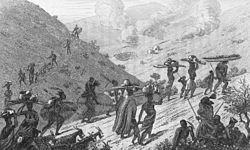Fingo (Mfengu)

An early painting of the first migration of the Fengu
|
|
| Regions with significant populations | |
|---|---|
|
|
|
| Cape Province | 1 million |
| Languages | |
|
Xhosa; Old Mfengu was a distinct language, Guthrie code S401 |
|
| Religion | |
| Christian, African traditional religion | |
| Related ethnic groups | |
| Nguni · Zulu · Basotho · Xhosa · Swazi · Matabele | |
| The Fengu (Fingo) people | |
|---|---|
| Person | umFengu |
| People | amaFengu |
| Language | isiXhosa |
| Country | Fenguland/Fingoland |
The Fengu (plural amaFengu) are a Bantu people, originally closely related to the Zulu people, but now often considered to have assimilated to the Xhosa people whose language they now speak. Historically they achieved considerable renown for their military ability in the frontier wars.
They were previously known in English as the "Fingo" people, and they gave their name to the district of Fingoland (Mfenguland), the southwestern portion of Transkei, in the Cape Province.
The name amaFengu means "wanderers" and the Fingo nation – like the Bhaca, Bhele, Hlubi and Zizi peoples – was formed from the tribes that were broken up and dispersed by Shaka and his Zulu armies in the Mfecane wars.
Most of them fled westwards and settled amongst the Xhosa. After some years of oppression by the Gcaleka Xhosa (who called the Fengu their "dogs"), they formed an alliance with the Cape government in 1835 and were invited by Sir Benjamin d'Urban to settle on the banks of the Great Fish River in the region that later became known as the Ciskei.
Some scholars, including Timothy Stapleton and Alan Webster, argue that the traditional narrative of the Mfengu as refugees of the Mfecane is in fact a lie constructed by colonial missionaries and administrators. They question the existence of the Mfengu as a distinct group prior to colonial contact, instead positing that the term was given, by the British, to a collection of Xhosa defectors, migrant laborers, and labor captives.
They subsequently became notable allies of the Cape Colony in the frontier wars against their former oppressors. In this capacity, they won several victories against their Xhosa enemies (particularly the Gcaleka Xhosa), and through shrewd and successful management of regional trade, formed a developed and materially successful nation. In addition, many bought farms and started businesses in the small towns that were springing up in that part of the Cape frontier.
...
Wikipedia
